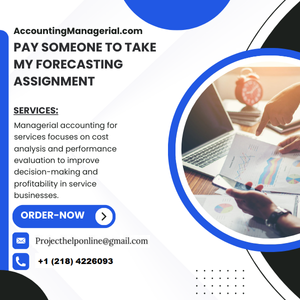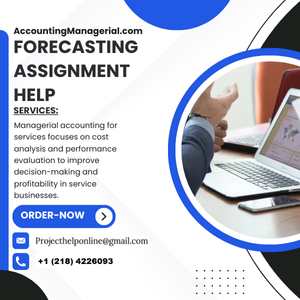How do you create a forecast for sales data?
How do you create a forecast for sales data? For more information please click here. An event control can perform
Most teachers provide assignment sheets or formal instructions with clear boundaries that help keep your essay within its stated length and thesis statement parameters, Forecasting helping to keep you focused and express your ideas clearly on any given subject matter. By adhering to such parameters, it will allow you to remain focused and effectively convey your point of view about a topic.
Managerial accounting is an interdisciplinary field that connects financial data to strategic decision making processes. It plays an essential role in business operations and is essential for their success.
Managerial accounting provides corporate leaders with an indispensable tool that allows them to assess the company’s current financial state, create spending budgets, reduce expenses and predict sales numbers in advance.
Financial accounting primarily targets external users; Strategy managerial accounts on the other hand serve internal users only. Financial statements must adhere to strict accounting principles while managerial reports may vary from department to department.
By employing managerial accounting, management can monitor trends in their product lines and production methods and analyze their effectiveness. They can also identify and address problems affecting productivity and profitability – for instance by tracking outstanding receivables they can identify when certain customers are not paying on time and take measures to mitigate credit default risks. Finally, by adapting its approach according to company needs, managerial accounting improves quality information provided to executives about business operation metrics.
Forecasting is a vital tool for businesses, helping to develop accurate predictions of future trends and events that allow for informed strategy development while mitigating risks or losses. Unfortunately, forecasting can be challenging without adequate tools and resources; luckily there are various techniques available that help data teams make informed decisions and become proactive rather than reactive.
Companies can utilize exponential smoothing to predict future revenue based on historical data while taking account of trends and seasonality, Forecasting Basics while HR departments can use ARIMA models to forecast staffing requirements based on historical hiring/attrition rates. Business Intelligence (BI) tools provide visual overviews of both present and projected data that allows businesses to assess whether their existing products, processes and budgets meet current goals/opportunities; it helps assess whether costs can be reduced and efficiency improved through thorough examination of all costs such as rent/salaries/attain/actinium costs in comparison with variable expenses such as raw materials/etc.
Budgeting is the process of creating financial statements for an organization, including projected revenue, expenses, cash flow and investments. Budgeting is an integral component of business as it allows companies to anticipate future growth goals and develop budgets to help achieve them. Quality assured data should be readily accessible as part of this process – using Business Intelligence software can often prove helpful here.
college students often need to balance academics with social activities and jobs, Types of Forecasts making writing an assignment on Managerial Accounting challenging for them.
There are a few strategies they can employ to increase their chances of success in any subject area. They should read their assignment instructions thoroughly.

Cost behavior is a principle in managerial accounting that studies how costs change with different activity levels and in relation to budgeting decisions and strategic business decisions. It helps in analyzing costs, controlling them, and foreseeing future conditions.
Studies of cost behavior can assist businesses in making more informed decisions regarding pricing and production volumes. For instance, automobile insurance providers could use cost behavior as a tool to gauge whether to increase or decrease prices depending on how many vehicles are sold – in turn improving their profit margin.
Fixed costs, step-fixed costs, variable costs and mixed costs all display different cost behaviors in response to changing activity levels; Methods Overview each may exhibit differing responses such as salesperson’s salary being fixed but commissions variable; thus the total sales and production may remain unaltered even as costs vary.
Demand forecasting allows businesses to make well-informed, data-driven decisions regarding production and inventory management. With accurate projections of future demand, businesses can avoid overstocking (tying up capital and incurring storage costs), or stocking out (resulting in lost sales and customer dissatisfaction).
Selecting the ideal strategy for your business requires having a clear understanding of all available information – quantitative from ERP systems or databases; qualitative insights from salespeople or the wider marketplace, etc.
Your sales team has an invaluable relationship with customers and is an invaluable source of information about product trends, competitor strategies and price changes and seasonal patterns. Insight from these teams may also shed light on one-off events that skew data-driven projections; for example, Forecasting Tools Oprah may have mentioned your product on TV and saw an immediate surge in sales, making projections impossible for future years. Also keep location in mind; an East Coast store may find fulfilling orders more quickly leading to greater demand.
Variance analysis is an integral component of managerial accounting that allows businesses to compare actual results against budgeted and forecasted projections. By identifying potential causes for budget variances and taking necessary measures to address them, variance analysis enables managers to improve profitability while meeting financial goals more easily.
Variances can arise for various reasons, including unanticipated expenses, cash flow changes and mismanaging accounts receivable and payable. To resolve such issues, management must first understand why the variance has occurred before taking the necessary steps to lower costs and prevent future problems.
Conducting a comprehensive variance analysis requires both time and resources which may be limited in some organizations. Therefore, Time Series Analysis prioritizing variance analyses according to their impact on financial performance using finance automation solutions in order to streamline this process and ensure key findings reach stakeholders effectively.
As it’s impossible to accurately predict the future, Data in Forecasting many business decisions rely on forecasts as a means to mitigate risk. This includes capacity planning, production planning, manpower planning and financial budgeting.
Students looking for assistance with their managerial accounting assignments can count on professionals for assistance. We specialize in various forms of data and time series analysis as well as external factors like weather changes, consumer surveys and sales force polling.

Managerial accounting is an indispensable form of accounting that provides managers with financial insights that assist with decision-making. Unlike financial accounting, which serves external reporting needs only, managerial accounting uses internal decision-making and planning as its purpose.
For instance, if a sportswear company plans on introducing team-branded mugs into its product lineup, detailed financial projections must be created that outline sales, costs, and eventual profits. While historical financial accounting data from previous product lines might prove helpful in doing this task efficiently, managerial accounting will focus specifically on creating projections tailored towards this new project.
Managerial accounting’s chief benefit lies in its cost-volume-profit analysis (CVP), a technique for comparing different projects or products and understanding their effectiveness, Business Applications in order to identify most profitable opportunities and how much managers should charge for services. Furthermore, managerial accounting provides valuable budgeting and performance evaluation features; its impactful analysis helps businesses make crucial decisions regarding resource allocation as well as pricing strategies.
Time series analysis involves studying the patterns and trends present in data collected at specified intervals over time. It is used in data mining, pattern recognition, machine learning and signal processing applications as well as being crucial in risk analysis and forecasting.
Time series data differs significantly from other forms of information due to its inherent temporal ordering, necessitating careful preprocessing in order to eliminate inaccurate data and ensure any patterns observed aren’t simply noise or outliers.
Businesses use regression analysis as a method for studying changes to their business and anticipating future outcomes. They might track sales over time to identify seasonal patterns or determine the most efficient promotional activities to conduct. They might also conduct intervention analysis to see whether certain events have any potential to alter time series, Challenges in Forecasting such as measuring employee performance before and after training programs.
Financial forecasts play an integral role in decision-making processes and can assist businesses with long-term planning. But accuracy is of the utmost importance – inaccurate data or incorrect model specifications could produce inaccurate forecasts that lead to misleading results, while incorporating external factors like inflation rates or economic policies into your models could improve accuracy further.
Time series analysis is an invaluable method for forecasting financial trends. By recognizing patterns and seasonality that can help predict future events, time series analysis enables experts to optimize investment strategies more effectively while managing risks more efficiently.
For better financial time series accuracy, using models such as the autoregressive integrated moving average (ARMA) model or CNN-LSTM can help. Both models accurately identify linear and nonlinear features in data; as well as handling various timescales and formats. They can even help predict complex cyclical data sets with accuracy.
Know whether demand is increasing or decreasing is crucial for businesses, as this allows them to properly prepare. They may choose between tightening budgets or increasing production capacity and planning other operational activities such as inventory management, Future Trends warehousing and shipping.
Forecasting depends on a number of variables, including market and competitive dynamics, customer loyalty, product marketing strategies, pricing strategies and place. Furthermore, things that lie within a company’s control – like its location – such as densely populated areas which could increase product demand from its presence alone.
Forecasters need to start by understanding what information they currently possess and can access. Sometimes this means using data from ERP systems or spreadsheets; other times it could involve educated guesses or qualitative opinions. They should also decide how long they have before needing to make a decision on it all.
How do you create a forecast for sales data? For more information please click here. An event control can perform
How does the seasonal index help in forecasting? For seasonal variability in temperature during the year, seasonality is important. This
How do you deal with outliers in forecasting? Do you believe that it makes perfect sense to have poor or
What is the purpose of autocorrelation in forecasting?The purpose of autocorrelation is to predict how the events in the data
How do you forecast using linear regression? Are you have to take a big step (or what not?) throughout the
What are the limitations of Delphi method in forecasting? Delphi (version 11.3.2) is a distributed computer program developed for the
What is Delphi method in forecasting? Thought I could talk at length on if there is a quick answer to
How do you use historical data for forecasting future trends? I am currently trying to implement in my project the
What is a leading indicator in forecasting? By the time every year brings the right season to the market with
How do you forecast demand in inventory management? Do you expect inventory volume? How do you forecast demand? How do
Accounting managerial for services involves analyzing financial data to assist service-based businesses in planning, decision-making, and optimizing resource allocation.

![]()

Copyright © All rights reserved |Accounting Managerial